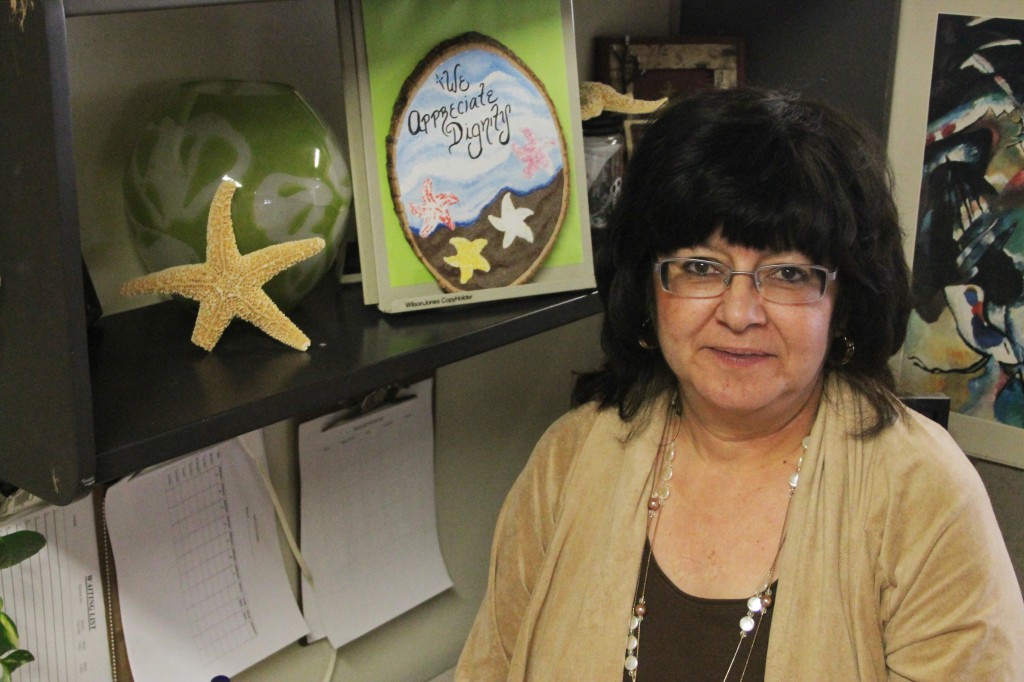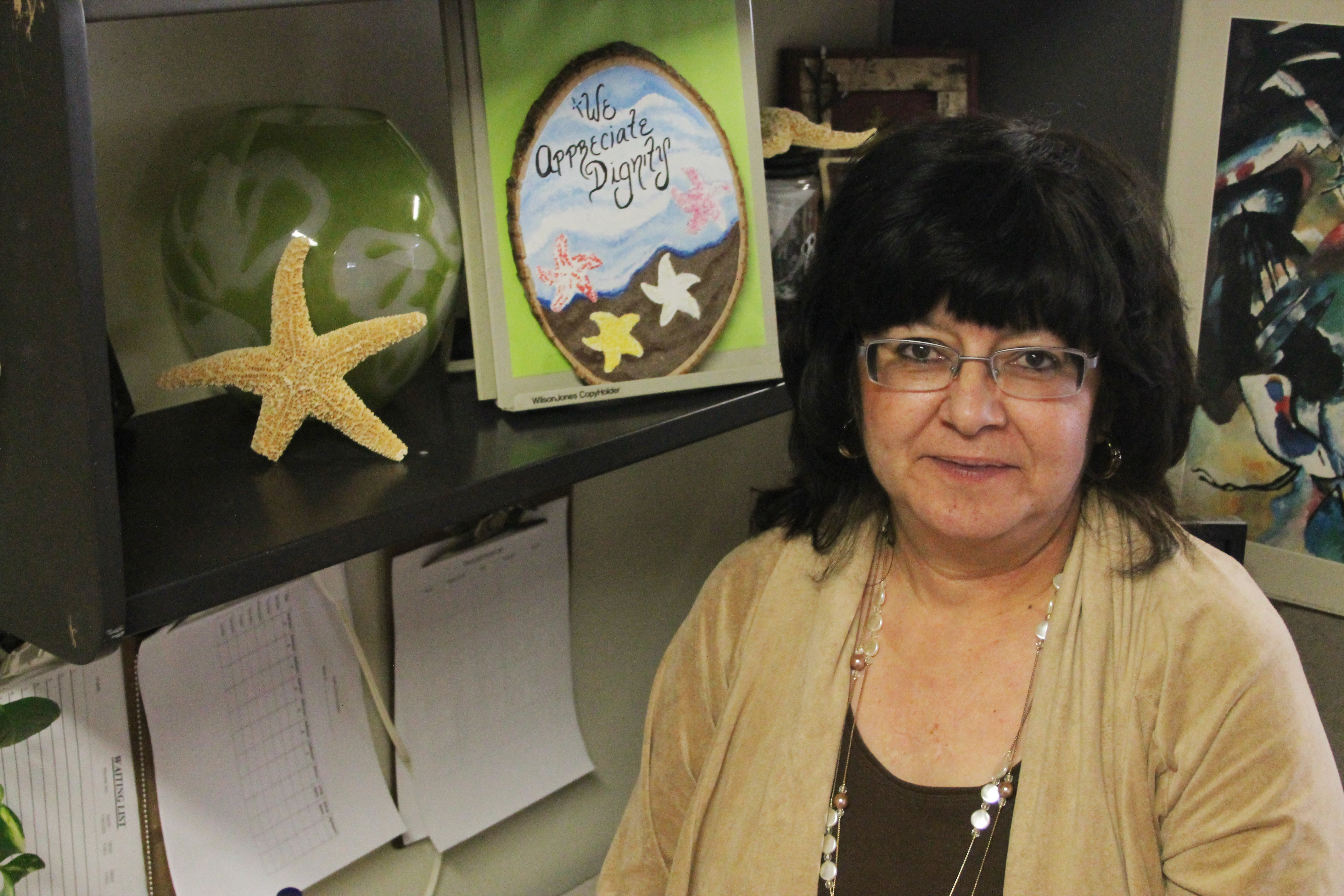
An eighth anniversary isn’t a traditional milestone to mark. But every day away from the life of human trafficking, especially sex trafficking, is worth celebrating.
That’s the milestone Catherine Ochoa is ready to mark May 10. These days, Ochoa said her life is filled with all kinds of blessings.
She’s now in her third year helping other women ready to escape a life of prostitution with Catholic Charities Community Services’ residential program. Ochoa has also reunited with her children, including a daughter who entered, and ultimately aged out of, the foster care system as a result of her mother’s lifestyle. Ochoa has bonded with her four grandchildren, too, and sees some several times a week. [quote_box_right]
Combatting sex trafficking
A family friendly comedy fundraiser supporting local efforts combatting human sex trafficking and domestic violence. Supports Catholic Charities’ DIGNITY program, Phoenix police, Moma’s House and Mending the Soul.
When: 7 p.m., May 10
Where: Comerica Theatre, 400 W. Washington St., Phoenix
Cost: $25 per person
Info: www.freetolaugh.org
Listen: Catherine Ochoa’s March 3 interview on The Bishop’s Hour
[/quote_box_right]
She earned a certification in drug and alcohol counseling in January and is working on an associate’s degree.
“I’m trudging through math and English as we speak,” Ochoa told The Catholic Sun.
Her sights are set even higher: a bachelor’s degree in business management and organizational
leadership.
But Ochoa’s outlook wasn’t always so bright. She worked the streets of north Phoenix for 15 years as a prostitute, spending time in and out of jail as a result.
It was a blessing in disguise. When Ochoa was picked up, she was hot, tired and hungry. Victims of human trafficking often go days without food or water. Some pimps don’t allow the women to leave “their corner” until they meet a quota.
Ochoa envisioned spending the rest of her life jumping in and out of cars, getting hurt and hurting other people. Her thoughts also drifted to her kids. She wondered if her children and grandchildren thought about her.
“Dear God, get me out of this. I can’t do this anymore,” Ochoa prayed.
About a week later, the police arrested her for the final time.
“Thank God I went to jail,” Ochoa said.
It was there she completed Catholic Charities’ prostitution diversion program called DIGNITY — Developing Individual Growth and New Independence Through Yourself. Some 83 percent of graduates do not re-offend. The City of Phoenix Prosecutor’s Office dismisses charges for DIGNITY graduates.
After the classes, Ochoa finally got the nerve to ask if a bed might be available at the DIGNITY house. Success rates there for residents who leave the life for good hover at 90 percent.
“I was wondering how long it was going to take you to ask,” a staff member told Ochoa.
Healing process
Catholic Charities is always ready to help a victim of human sex trafficking. They hit the streets weekly with water, food, clothing and information for crisis lines and other avenues of support.
Ochoa entered the lifestyle at age 30, well beyond the average age of 13. She yearned to escape the life, but didn’t know how.
Catholic Charities did.
“I remember all the patience and the kindness and the love that the staff showed me when I was contemplating getting into the program,” Ochoa said. “They continued to shower me with love when I didn’t think I was lovable. I didn’t love anybody, let alone myself. I thought I was throwaway.”
Catholic Charities guided her through the healing process so she could start life anew.
Ochoa shared in an interview on “The Bishop’s Hour,” a diocesan radio program that airs each Monday at 11 a.m. on 1310 AM Immaculate Heart Radio, that part of her life in prostitution stemmed from the effects of being molested as a child.
“I think drugs and alcohol covered that underlying problem,” Ochoa said.
She used prostitution as a way to supply her drug and alcohol addiction. It’s a $15 billion industry in the United States, Phoenix Mayor Greg Stanton said at a Feb. 28 luncheon addressing human trafficking.
“Prostituted individuals endure a brutal life of modern slavery,” the mayor said.
Phoenix’s warm weather and freeway system, among other factors, make it an attractive area for buyers.
That also puts Phoenix on a circuit, meaning victims can easily and quickly be transported to another state. The city and Catholic Charities are part of an Anti-Human Trafficking Task Force, which means that a more formal local response is on the horizon. An Arizona House bill would increase the penalties for child sex trafficking.
The mayor said the window of opportunity to take action is open, especially with the Super Bowl coming to Arizona next year. The big game also attracts “johns.”
Arizona isn’t alone in human trafficking issues though. It’s a national and global problem.
Modern-day slavery
Trafficked persons is a newer term to the 150-year-old issue of slavery, Luis CdeBaca, ambassador-at-large in the U.S. State Department told community leaders at the same luncheon as the Phoenix mayor. CdeBaca heads the anti-human trafficking site.
“Those not in the industry or law enforcement don’t realize this is happening and how their inaction is allowing it to continue,” CdeBaca told The Catholic Sun.
He said it’s vital to stay alert. CdeBaca has seen cases where the victim was allowed to attend church services but the perpetrator sits one pew back. The church in the United Kingdom will be more vigilant. CdeBaca met with its conference of bishops last month and learned that an anti-trafficking coordinator will be in every diocese there by the end of the year.
A working Vatican group on trafficking in human beings is also developing a response. The group met in November to examine the social tragedy and will ultimately draft an agenda to combat it.
CdeBaca said Phoenix is ahead of the curve when it comes to outreach for trafficked victims.






